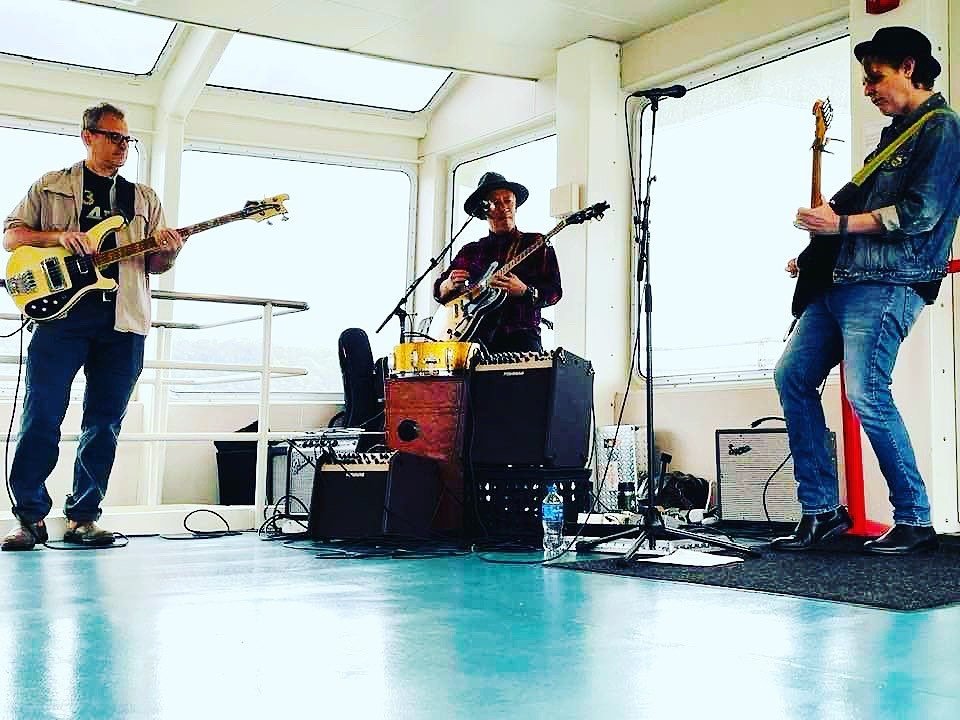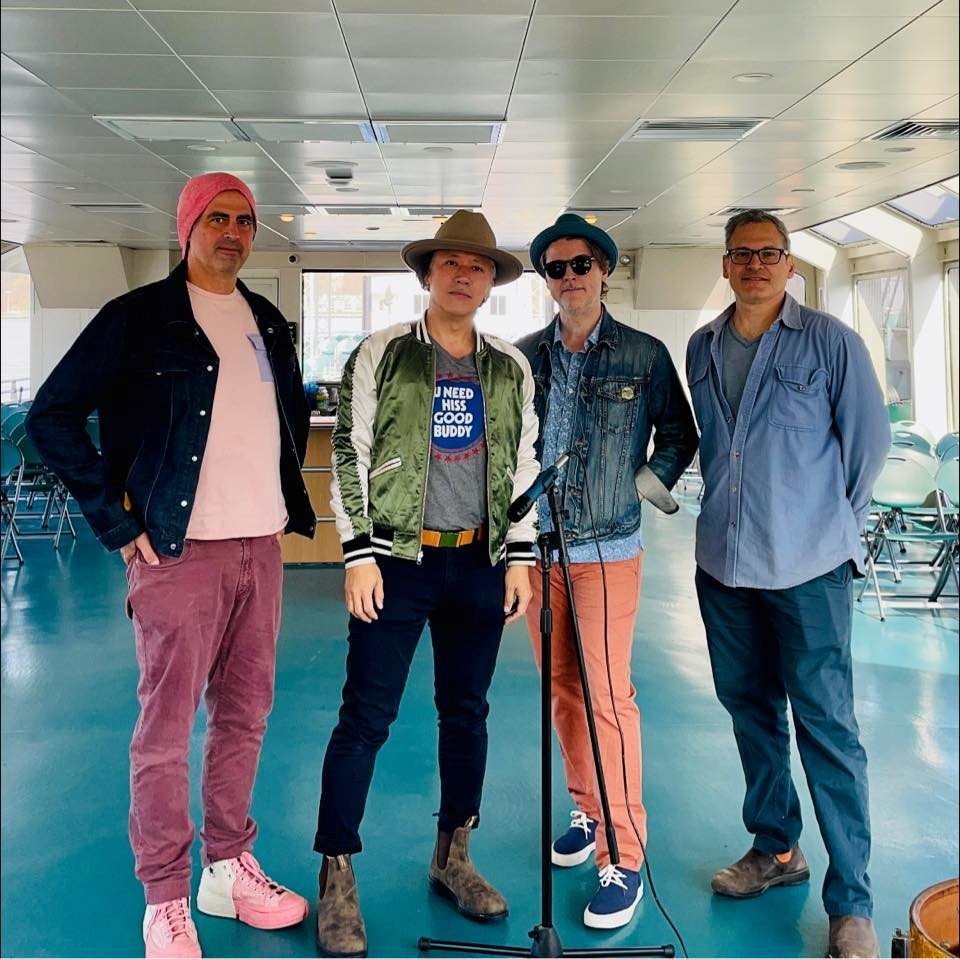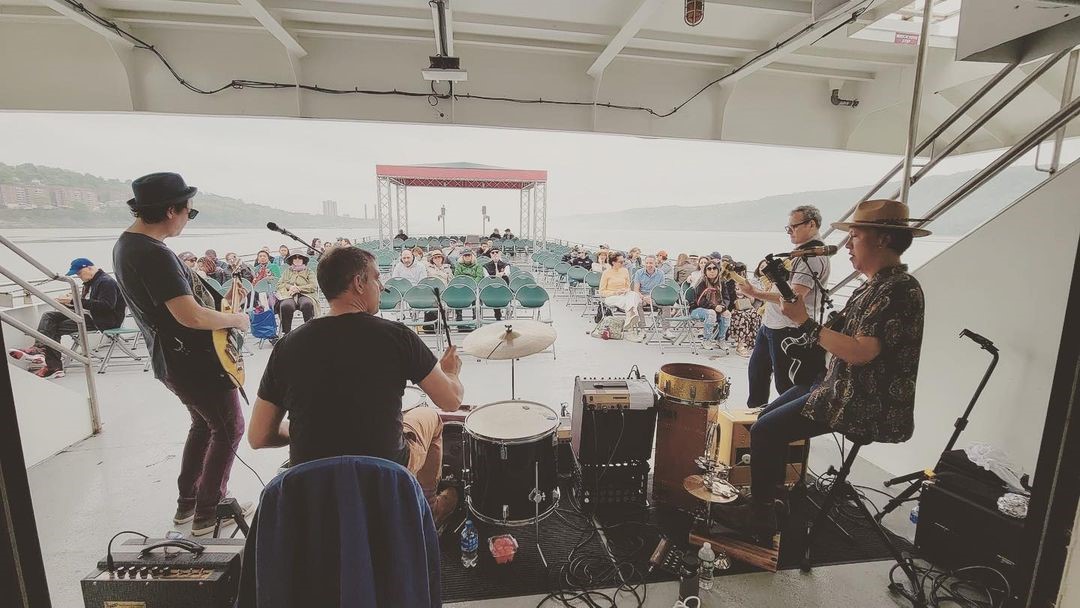Along with his bandmates (guitarist/vocalist Patrick Harmon, bassist Matt Svigals, and drummer John Malone), Miyuki Furtado, a Hawaiian-born multi-instrumentalist who sings, plays guitar, and drums concurrently, leads the alt-country rock band DIVINING ROD. After the pandemic, the band releases an exciting new album. After finishing a two-month stint on New York’s famed Circle Line Cruises playing long hours to unruly audiences, the seasoned band entered Virtue and Vice Studios and recorded and mixed 12 songs with Anthony TJ ‘Rocky’ Gallo (Cigarettes After Sex, John Legend) in a matter of days. The majority of the tracks were recorded live within a few days. Songs that are melodic, lively, raucous, and delicate, played with heart and reverb.
Divining Rod are founding members of Irvington, New York’s annual Halloween porch band music festival. In Irvington, friends, neighbors, and volunteers have created and performed this annual, village-wide music crawl for the past eight years, attracting hundreds of visitors annually. This little, picturesque community 30 minutes north of New York City celebrates Halloween with great gusto. Before and during Halloween, a film of “Mason County Line” was recorded, and the footage must be seen to be believed. Check out the song and the exclusive interview below:

1. Can you tell us a bit about where you come from and how it all got started?
DIVINING ROD: Heya! This is Miyuki Furtado. I’m from the island of Kauai in Hawaii but I now live in Irvington, New York. Divining Rod started as a psych folk acoustic solo side project after my old band, The Rogers Sisters, split. I had just moved out of Brooklyn after 7 years of non-stop touring and recording. I needed a break. The project was an on again/off again thing until I met up with Patrick Harmon, after which it became a country rock band. Then we recruited our neighborhood friends, Matt Svigals and John Malone to flesh out the band.
2. Did you have any formal training or are you self-taught?
DIVINING ROD: I’m a drummer by trade and took instruction on that instrument. Then I was a touring bass player(after bluffing my way through a band try out) and now I play guitar and drums simultaneously on my homemade contraption made of an old suitcase and a stomp box. I’m a self taught guitarist in which I play in an open tuning.
3. Who were your first and strongest musical influences and why the name ‘DIVINING ROD’?
DIVINING ROD: I was surrounded by music early on in Hawaii. My uncles, aunts and cousins played at every family get together. I heard lots of traditional Hawaiian music (Gabby Pahinui, Cecilio and Kapono, Maka’a Sons of Niihau), as well as country music. I’m a pretty much a musical omnivore but I suppose I love Country the most- Hank, Merle, Willie Nelson, Johnny Cash, The Stanley Brothers, Bill Monroe, Buck Owens, Jerry Reed, Blaze Foley and many others.
My friend, Arika Casebolt, thought of the name Divining Rod for a short lived band a long time ago. I started going under that moniker when I started my solo project. I guess it stuck with me. I like the idea of the dowsing rod (aka divining rod). It could either be a divine instrument used to find water OR a complete con. I like that dichotomy.
4. What do you feel are the key elements in your music that should resonate with listeners, and how would you personally describe your sound?
DIVINING ROD: I think we’re a pretty dang solid Country Rock band. Me and our guitarist, Patrick, cut our teeth playing punk and psych rock/pop so that informs the way we approach our guitar sound. My drummer John and I both play kits that I built from old suitcases that I found at flea markets and yard sales. No one expects us to sound how we sound when they look at our fairly chaotic, handmade set up. We’re a Country band, a Rock band, a Garage band and a Folk band. But sometimes we’re none of those things
I suppose I would describe our music as a Honky Tonk Racket Sandwich.

5. For most artists, originality is first preceded by a phase of learning and, often, emulating others. What was this like for you? How would you describe your own development as an artist and music maker, and the transition towards your own style, which is known as COUNTRY?
DIVINING ROD:
My dad worked for the US Foreign Service so we traveled a lot when I was a teen. I was exposed to a lot of cultures and music. I’ve played in tons bands with lots of (mostly noisy) styles. After moving out of Brooklyn, I needed some quiet time. I started listening to heaps of records and outlaw country radio stations over the pandemic and that fueled my writing. As a lyricist, I love the turns of phrases and the narrative in Country. That being said, I’m not a traditionalist and have no interest in being a cover act so I bring in the many influences that have seeped into my brain over the years.
6. What’s your view on the role and function of music as political, cultural, spiritual, and/or social vehicles – and do you try and affront any of these themes in your work, or are you purely interested in music as an expression of technical artistry, personal narrative, and entertainment?
DIVINING ROD:
I write about what I’ve experienced- whether it’s people I meet, stories I hear and/or what I feel. I’m not a protest singer or a musical activist. I’m not averse to it, though. There’s a lot of struggle in the world and I write what I see, whether it’s racial oppression or wealth disparity or being stressed being in large crowds, post-pandemic. That being said, I mostly write about love and heartbreak haha.
7. Do you feel that your music is giving you back just as much fulfillment as the amount of work you are putting into it or are you expecting something more, or different in the future?
DIVINING ROD:
I’ve been fortunate enough to make music on my own terms and play shows for most of my life, However, as anyone who creates can tell you: it sure as hell ain’t easy. At times, it can feel hopeless and overwhelming. Other times it brings unsurpassed joy. But it’s always a struggle, that’s for certain. I will always be compelled to write and record and play so I intend to do that as long my body and mind can last.
8. Could you describe your creative processes? How do usually start, and go about shaping ideas into a completed song? Do you usually start with a tune, a beat, or a narrative in your head? And do you collaborate with others in this process?
DIVINING ROD:
I am all over the map, so to speak, when it comes to writing. Sometimes songs come fully formed and I can sort them out in a couple of minutes. Other times, there’s lots of work and editing involved. I guess that’s the thing about inspiration: it’s never comes the same way twice. I’ve found that playing with my band is how all of my songs truly find definition and life. It’s good to share and pass ideas around to others. They often return to you in better shape than when you started.
9. What has been the most difficult thing you’ve had to endure in your life or music career so far?
DIVINING ROD: There’s been lots ups and downs in my life in music. Some trivial and some of note. On a more Personal level, the loss of my father a few years back was especially hard.
10. On the contrary, what would you consider a successful, proud or significant point in your life or music career so far?
DIVINING ROD: Of the good times, I was fortunate to tour around the globe a bunch. I played a Peel Session before John Peel passed. I played great festivals in Barcelona, Belgium, London and Istanbul But I’d be just as happy playing on a front porch with my friends. Mostly, I feel grateful anytime I play for folks who like what I’m doing.
11. With social media having a heavy impact on our lives and the music business in general, how do you handle criticism, haters, and/or naysayers in general? Is it something you pay attention to, or simply ignore?
DIVINING ROD: All I know is that you better have damn thick skin when you put stuff out into the ether. Take heartfelt critiques and advice with grace and dignity and shake off the negative haters. I’ve gotten some bad reviews in my time but I’m flattered that those folks took a ton of time out of their day to complain about the crap that I’m doing. I’m looking at you, Pitchfork hahaha!
12. Do you think is it important for fans of your music to understand the real story and message driving each of your songs, or do you think everyone should be free to interpret your songs in their own personal way?
DIVINING ROD: I’m alway grateful when someone gets what I’m trying to say because when you get down to it, art in all it’s forms is about communication, ain’t it? That being said, we should make up our own damn minds what we think of something we hear, taste, see, read, feel, etc. Get out there and live your life!
KEEP IN TOUCH:
FACEBOOK | INSTAGRAM | TWITTER | SPOTIFY | BANDCAMP | WEBSITE | YOUTUBE

Photo credits: Mason County Line, Jason Velez

